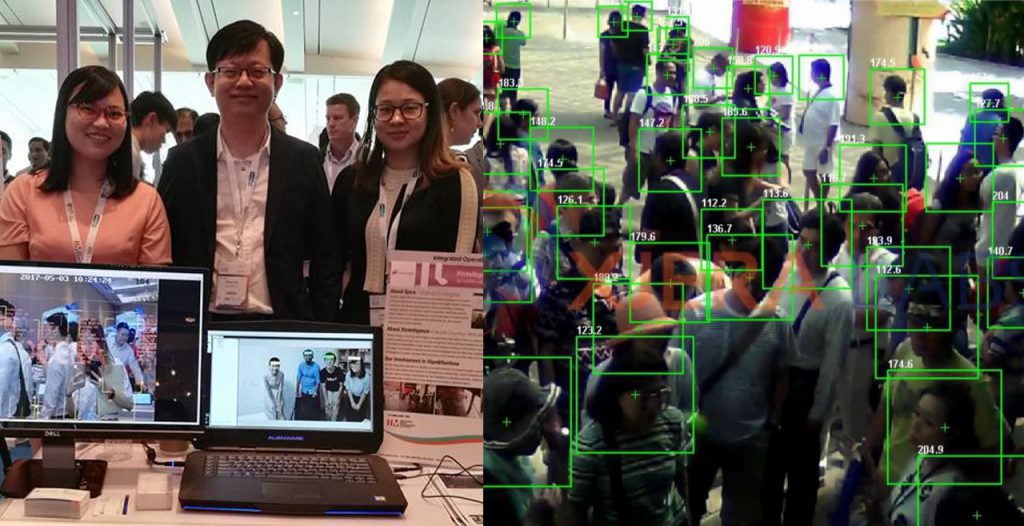What do you know about facial recognition technology?
For many, it might bring up images of high-security buildings which can only be accessed with a face or iris scan.
Another more commonly known usage of facial recognition technology is probably the ‘face unlock’ function incorporated into the latest smartphones.

But the application of this technology is actually more multi-faceted than many know it to be.
For example, the technology is currently tested and deployed at Airport Terminals to bring convenience to passengers through queue management software services.
And it’s not only at our airport – the technology is also being used by private players in the local market, including F&B outlets and hotels.
From crowd prediction to traffic management, the technologies allow users to better manage their operations and improve their efficiency in the long run.

Xjera Labs is a homegrown SG:D Accredited company that has been at the forefront of such facial recognition technology, and has clinched clients for those very purposes.
Some of their prominent customers include retail malls, security agencies, large corporations that run theme parks, and schools in China.
I was interested to find out more about Xjera Labs so I dropped by their office to have a quick chat with the CEO & Founder, Dr. Ethan Chu.
Inspired By The Wide-Scale Potential Of Automation
Prior to starting Xjera Labs, Dr. Chu came from an academic background.
After graduating from Nanyang Technological University (NTU), he went on to earn his Masters and PhD degrees from the University of Illinois at Urbana-Champaign’s Electrical & Computer Engineering School.
He also held R&D and management positions in Qualcomm, HP Labs in the United States, and was a visiting researcher at the University of California, Berkeley.
But I was curious as to what got him interested in AI and automation in the first place.
“That’s a very interesting question,” he smiled, as he recalled the time when he observed his great-grandmother painstakingly watering all her plants for “at least 2 to 3 hours every morning”.
“Eventually, my uncle [and I] designed a tube with a floating mechanism […] that helped to water all the plants [without manual labour].”
[It was then that] I was convinced then that automation has a lot of potential.
This incident was the spark for Dr. Chu’s flame, but the ember that kept it going came when he noticed the wider-scale applications of automation in various industries.
For example, during a visit to a traffic survey company, he noticed that despite having around 100 staff employed solely to count vehicles entering their building, the numbers were still far from accurate.
This spurred Dr. Chu’s desire to not just study AI, but create solutions to “help humans do less mundane work”.
At the end of 2013, Xjera Labs was born.
Identifying Individuals Or Vehicles Of Interest Within Minutes
In the five years since inception, the Xjera Labs team has worked tirelessly to develop the proprietary Athena Platform, a complex and powerful multi-layer neural network system that allows users of their products to single out individuals or vehicles that have certain attributes, within minutes.
To ensure high accuracy and reliability, their products are supported by six neural networks, which are computer algorithms that simulate the learning capabilities of a human brain, to focus on multiple aspects of a subject.
For example, one neural network focuses on facial expression while others focus on aspects such as actions and text detection.
In layman’s terms, it means you can use the platform to quickly identify subjects with attributes of interest (like “striped shirt”, or “blue lorry”) from video footage.
Currently, Xjera Labs has 3 main products to effectively address the varied needs of their customers:
- XHound: Used for post-event search for faces, attributes, and abnormal events
- XIntelligence: Used in real-time operation for surveillance and safety applications, crowd management, and attribute detection
- XTransport: Used for intelligent transport applications like traffic survey, vehicle flow estimation, and speed estimation

Unlike many off-the-shelf products from competitors, Xjera Labs also provides customised video analytics solutions to meet the needs of customers who have more specific requirements.
“We Appreciate Our Competitors”
Dr. Chu added that getting customers to believe in their product was tricky in the early days.
While fields like AI, coding and AR/VR are sexy topics right now, it wasn’t the same case back in 2012 and 2013.
“AI wasn’t a popular word,” he recalled. “There were also some traditional large enterprises across the world [who were resistant to it].”
That’s why we appreciate our competitors, because they help us to create awareness among the public and our customers.
It was also difficult to convince certain customers that albeit being a small startup, their product could hold its own in comparison to the offerings from larger tech companies.
It was only after AI gradually became more “mainstream” that the team saw a positive turn of events.
Out of all their milestones, Dr. Chu considered Xjera Lab’s participation in the inaugural Video Analytics Tech Challenge organised by the then-Infocomm Development Authority of Singapore (IDA) in 2015 as one of the most impactful.
“We emerged as the winner, and that’s actually one of our very important credentials.”
The firm went on to win the Video Analytics Challenge in 2017 organised by the Changi Airport Group in 2017.
It’s quite difficult to explain [our AI technology] to people, but having these track records have helped us a lot.
Clinching Government Clients, Getting Accredited
It was also during the IDA-organised Video Analytic Tech Challenge that the Xjera Labs team got acquainted with the Accreditation@SG Digital (Accreditation@SGD) programme.
Launched by the Infocomm Media Development Authority (IMDA) in July 2014, Accreditation@SGD is a programme that accelerates the growth of innovative Singapore-based infocomm media companies by helping these companies to establish credentials, build track record and scale globally.
Dr. Chu admitted that applying to be accredited was “quite an easy decision”.
For a company, the most important thing is recognition from customers. And as a startup, if we have a government agency that supports us, it’s very convincing to customers.
“The programme also has teams that help us to connect to government agencies who have real requirements for our technology.
“They actually looked into all aspects of the company – like the technical details, our business prospects, our financials. Overall, it’s a very comprehensive evaluation process.”
On 18th March this year, they proudly announced their accredited status. Since “IMDA has a high bar”, attaining their accreditation has helped to increase the company’s standing in the industry.
“Accreditation gives us a channel that helps us to interact directly with the customers. There are also quite a few deals that we secured through the programme as well,” he said.
Next Up: Expansion To Vietnam
Currently, there are around 25 staff on the team, and their job scopes range from software architecture to algorithm development and project management.
They also have a sales team based in China, a result of a partnership with a Chinese company.
When asked about their expansion plans, Dr. Chu revealed that they’re currently looking at the Vietnamese market.
We wanted to start in a Southeast Asian country, which has developed to an extent where they can appreciate our technology.
“Market size was also another consideration, and whether there are government agencies in Singapore who can work alongside us – just like how IMDA is working with us,” he chuckled.
“When People Don’t Recognise You, You Shouldn’t Feel Bad About It”
Ending off the interview, I asked Dr. Chu for advice that he’d give fellow startups.
For him, ensuring that the company’s mission aligns with team members’ personal goals is of paramount importance.
“You have to believe in this mission, because it’s only belief that can help the company go through very hard times […] like when people don’t appreciate what the company is doing.”
He recalled the early days of Xjera Labs, when many were still sceptical about the potential of AI and automation.
“I think [this scepticism is] quite normal – it’s not that I’m blaming anyone,” he clarified.
“I also believe that at that point of time, the truth is held in the hands of a few. But when everyone starts [jumping on the trend], your time has already passed.”
When people don’t recognise you, you shouldn’t feel bad about it, it’s actually a good sign that you are ahead of the game (and thus have a first mover advantage).
We’d like to thank Dr. Chu for his time.
This article was written in collaboration with Accreditation@SG Digital.










